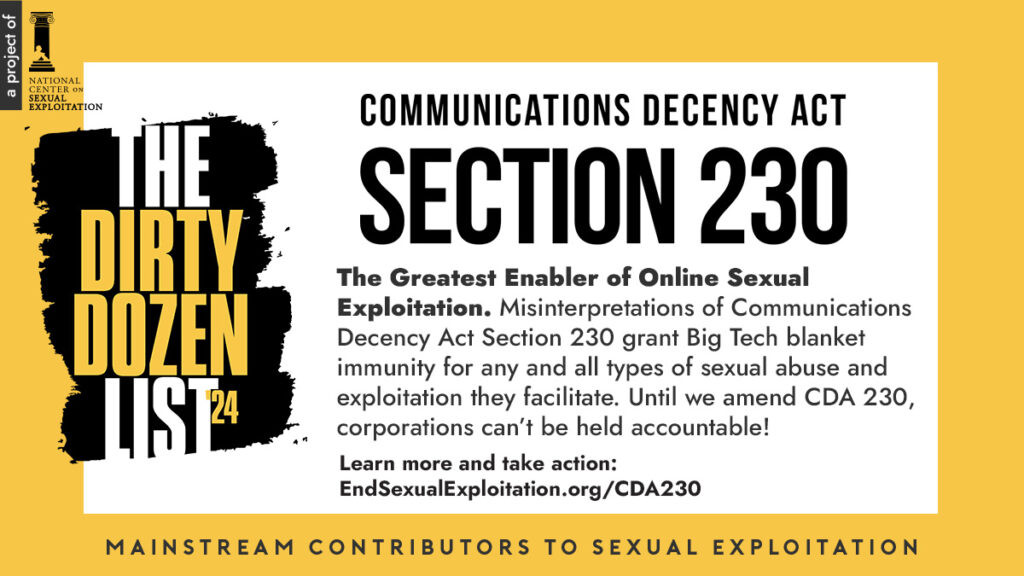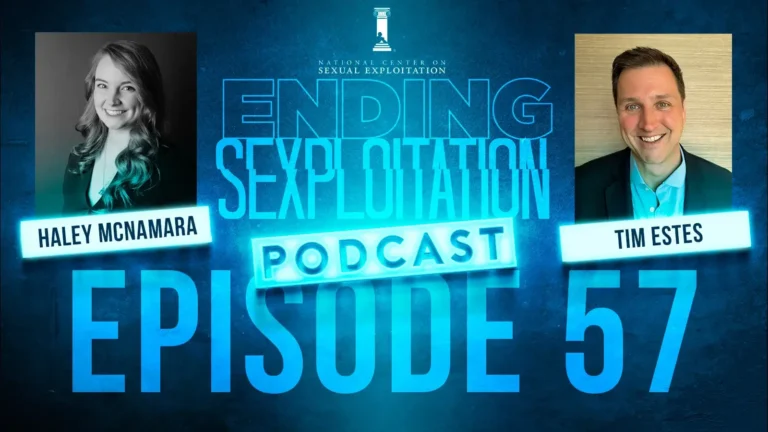Fifteen-year-old John Doe (pseudonym) was seeking people who would accept him. People who wouldn’t bully him for being on the spectrum. Or for being gay.
He thought he could find that on the Grindr dating app.
But instead, Grindr “matched” John with four adult men who repeatedly raped him.
Undoubtedly, those four adult men shoulder the blame for John’s rape. But so does Grindr.
Grindr claimed to be an 18+ dating app, yet it is aggressively marketed to children. It did not verify John’s age when he signed up for an account. Instead, it welcomed the child onto the app, geolocated him, and matched him with nearby adult predators.
But when John and his family filed a lawsuit against Grindr for facilitating this child sexual abuse, the court dismissed the case. Why, you may ask? Because current law prevents tech companies from facing repercussions when their platform harms its users, even when the company clearly took an active role in causing that harm.
Carrie Goldberg, attorney for John Doe and his family, shared this story last week at a Senate Judiciary Commitee Hearing on Communications Decency Act Section 230. Section 230 is the reason John and his family were robbed of justice. It must be repealed.

John Doe’s situation is tragically common. In the hearing, Goldberg cited an article published in the Journal of Adolescent Health that found 50% of gay teens who are sexually active have their first sexual encounter with an adult they met on Grindr.
But as long as Section 230 exists, Grindr, or any tech platform that actively facilitates sexual exploitation (which is a lot of them), will rarely be held accountable.
Senate Judiciary Committee Questions Experts and Survivors on Section 230
The Senate Judiciary Hearing last week featured an array of expert witnesses who testified to the widespread, severe harm caused by Section 230—including its impact on child sexual exploitation.
Senator Josh Hawley, passionately questioned John Pizzuro, a witness and CEO of Raven, about the astronomical growth of child sexual abuse material (CSAM) available online.
“In 2023 there were 104 million images and videos of suspected child abuse material uploaded onto the internet, compared to 450,000 in 2004,” said Hawley, referencing a chart showcasing this data. Their exchange continued as follows:
Hawley: “It’s just an enormous explosion. It’s absolutely everywhere. So let me ask you about some of the remedies for this: If you’re a parent of a victim of child sexual abuse material and your child’s image has been used, they’ve been exploited. You’ve got companies who have hosted that content recklessly or intentionally or negligently. If you’re a parent, can I sue them and get them to take it down?”
Pizzuro: “Right now, no. You can sue them, but I don’t know how successful you’re going to be.”
Section 230 Prevents Survivors from Having Their Day in Court
Professor Mary Graw Leary, a former prosecutor specializing in issues of exploitation and current professor at the Catholic University of America, testified to the “de facto near absolute immunity” that Section 230 provides for tech companies.
“As an immunity, these cases are thrown out on a motion to dismiss, so there’s no access to discovery. So, when we say that victim survivors, state’s attorneys general are shut out of the courtroom, we don’t mean it’s very hard to win these cases. We mean they are shut out of the courtroom. They do not have their day in court.”
“No way to look under the hood of this incredibly dangerous industry”
— National Center on Sexual Exploitation (@NCOSE) February 19, 2025
Great statement from @LearyOnLaw.
CDA 230 gives full immunity to #Bigtech#senatelive #housejudiciary https://t.co/wVgnIKGvGK
Leary points out what’s so dangerous about Section 230 is that it allows many lawsuits against tech companies to be thrown out on a motion to dismiss. This means the lawyers for the tech companies are not required to turn over any discovery to the plaintiffs. For example, discovery could include internal company documents that potentially reveal the company’s knowledge that its platform was causing harm.
“There is no way to look under the hood of this incredibly dangerous industry,” said Leary.
Big Tech lawyers can defer to Section 230, even in the most heinous cases. For example, in NCOSE’s lawsuit against Twitter, Twitter’s lawyer admitted that the company chose not to take down reported child sexual abuse material, even after reviewing and verifying the report—but went on to say that it didn’t matter, because under Section 230, Twitter is protected. Section 230 has allowed tech companies to be void of any sort of moral responsibility.
Child Online Safety Bills Have Vast Bipartisan Support – So Why Can’t They Pass?
Members of the House Judiciary Committee mentioned multiple times the rare bipartisan (in some cases, unanimous) support for laws regarding child online safety.
“These bills were reported out of this committee unanimously,” said Senator Dick Durbin, in reference to a few child online safety bills that made it out of committee last session. However, only one of the bills, the REPORT Act, was signed into law. The others were held up in Congress.
“For anyone who’s a newcomer to Capitol Hill, or to this committee, you have the American political spectrum from one end to the other on this committee,” he continued. “And for us to do anything unanimously is nothing short of a political miracle. We did it. 5 times.”
So why were so many of these bills held in limbo? Big Tech dollars.
“Big tech opened up a $61.5 million dollar lobbying war chest to make sure these bills never became law,” said Durbin.
Last year, after passing the Senate 91-3, the Kids Online Safety Act (KOSA) was never brought up for a vote in the House. Why? Marsha Blackburn said it best:
“They (Big Tech lobbyists) went with distortions and lies to the House, and it did not get through.”
Blackburn, a Republican, was one of the original sponsors of KOSA, alongside her Democratic colleague, Senator Richard Blumenthal.
A Message to Congress from Survivor Parent: “Please Don’t Let Us Down Again.”
South Carolina state representative, Brandon Guffey, offered testimony at Wednesday’s hearing. Guffey lost his 17-year-old son, Gavin, to suicide after he was victimized through sextortion. Sextortion is a financial and sexually exploitative scam targeting teens, which is on the rise as tech becomes ever more prevalent in the lives of young people. Cybercriminals often catfish teens, pretending to be someone who is romantically interested in them. After they gain their trust, they coerce them into sending sexually explicit images, which they then use as leverage against them to get money from the victim. Feeling like there is no escape, this scam often leads teens to take their own lives, as Gavin did.
After his son’s death, Guffey has dedicated his life to combatting child sexual abuse online and protecting teen mental health. He, along with countless advocates and survivors, was left devastated after the last Congressional session ended and crucial bills, including the TAKE IT DOWN Act and the Kids Online Safety Act, failed to even be put up for a vote in the House, despite passing decisively in the Senate.
“I would like nothing more than to be proven wrong about the inefficiency of Congress by having the House pass the TAKE IT DOWN Act soon,” said Guffey.
He made a heartbreaking plea to Speaker Mike Johnson and other members of House leadership to bring the bill up for a vote:
“Will it take one of your own children or grandchildren to finally get fed up enough to move?” he asked. “The ball is in your court. Please don’t let us down again.”
Members of the Senate Judiciary Committee are receptive to the pleas of Guffey and the thousands of survivors of online sexual abuse. Senator Amy Klobuchar, an original sponsor of the TAKE IT DOWN Act, said she and some of her colleagues (on both sides of the aisle) are introducing a bill that would “sunset Section 230 of the Communications Decency Act in two years.”
“This is long overdue,” said Klobuchar. “Section 230 and the legal immunity it provides to Big Tech has been on the books since 1996, long before social media was part of our lives. To the extent this protection was ever needed, its usefulness for this so-called ‘fledgling industry’ has long since passed.”
The question is, then, will the rest of Congress continue to look starry-eyed at the deep pockets of Big Tech? Or will they do the noble thing, and protect children from the lethal dangers posed by this digital anarchy?



